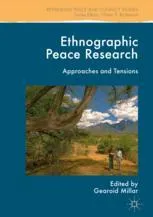Ethnographic Peace Research: Approaches and Tensions
4.7
Reviews from our users

You Can Ask your questions from this book's AI after Login
Each download or ask from book AI costs 2 points. To earn more free points, please visit the Points Guide Page and complete some valuable actions.Welcome to the world of ethnographic inquiry into peace and conflict studies. "Ethnographic Peace Research: Approaches and Tensions," edited by Gearoid Millar, offers a profound and in-depth exploration into the methodologies and dynamics of ethnography within the domain of peace research. This book brings together a range of perspectives and case studies, underlining the complexities and nuances involved in ethnographic fieldwork when applied to studying peace and conflict.
Summary of the Book
Ethnographic Peace Research is an innovative anthology that delves into the practice of ethnography as a method for understanding the intricacies of peace and conflict. The book is articulated through various chapters written by different scholars, each contributing unique insights and analyses based on their fieldwork experiences around the globe. These contributions challenge conventional quantitative and theoretical peace research methods, emphasizing the importance of context, lived experiences, and local narratives.
The book addresses the gap between high-level peace agreements and the everyday realities faced by individuals in conflict zones. Through ethnographic methods such as participant observation, interviews, and immersion, contributors illuminate the lived experiences of communities, offering a holistic understanding of peace that transcends mere ceasefires or political accords. The chapters are interspersed with reflective discussions on methodological challenges, ethical considerations, and the power dynamics inherent in ethnographic research.
Key Takeaways
- Ethnography as a tool for peace research emphasizes the significance of context-specific details and individual narratives.
- Understanding peace requires acknowledging the complex relationships between local actors, their histories, and everyday challenges.
- The book underscores the ethical quandaries and dilemmas faced by researchers in conflict-affected areas.
- A recurring theme is the discrepancy between international peacebuilding efforts and local perspectives of peace and security.
- Reflexivity and self-awareness are critical in ethnographic research to avoid biases and misrepresentations.
Famous Quotes from the Book
"Ethnography is not just a method; it is a commitment to understanding the human condition in its most raw and immediate expressions."
"To grasp what peace means to those who live it, we must listen to the subtleties of their voices, the nuances of their words, and the silences in between."
Why This Book Matters
In today's world, where conflicts are increasingly complex and deeply rooted in cultural, social, and historical contexts, "Ethnographic Peace Research: Approaches and Tensions" offers an essential contribution to peace and conflict studies. The book challenges scholars and practitioners to look beyond traditional frameworks and consider the essential roles that individual and community experiences play in shaping peace initiatives. By advocating for a bottom-up approach, the anthology provides critical insights into how peace is conceptualized, pursued, and maintained in different contexts.
Moreover, this book serves as a pivotal resource for both students and seasoned researchers, equipping them with the methodological tools to conduct fieldwork ethically and effectively in challenging environments. It encourages a scholarly dialogue that is both reflexive and critical, ultimately contributing to more nuanced and effective peacebuilding strategies.
Free Direct Download
You Can Download this book after Login
Accessing books through legal platforms and public libraries not only supports the rights of authors and publishers but also contributes to the sustainability of reading culture. Before downloading, please take a moment to consider these options.
Find this book on other platforms:
WorldCat helps you find books in libraries worldwide.
See ratings, reviews, and discussions on Goodreads.
Find and buy rare or used books on AbeBooks.
1226
بازدید4.7
امتیاز50
نظر98%
رضایتReviews:
4.7
Based on 0 users review
"کیفیت چاپ عالی بود، خیلی راضیام"
Questions & Answers
Ask questions about this book or help others by answering
No questions yet. Be the first to ask!


